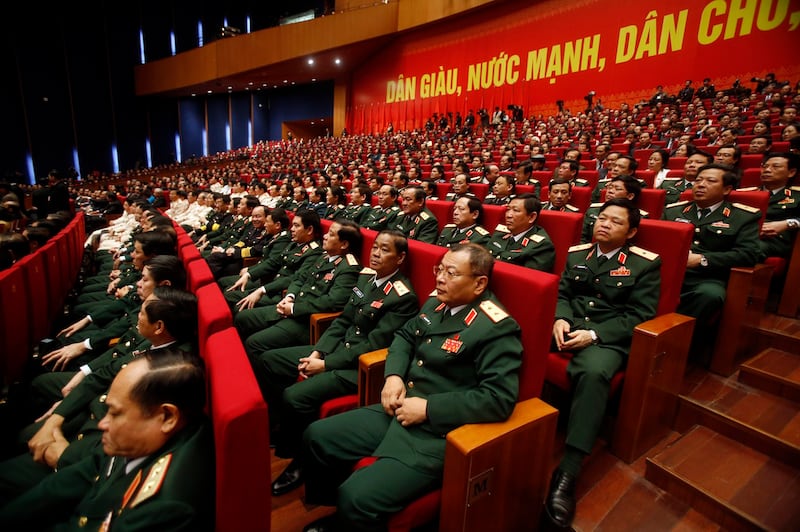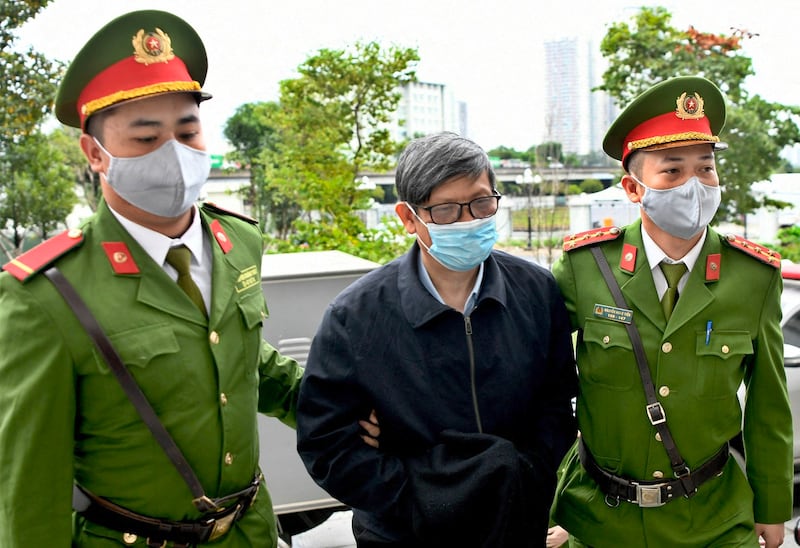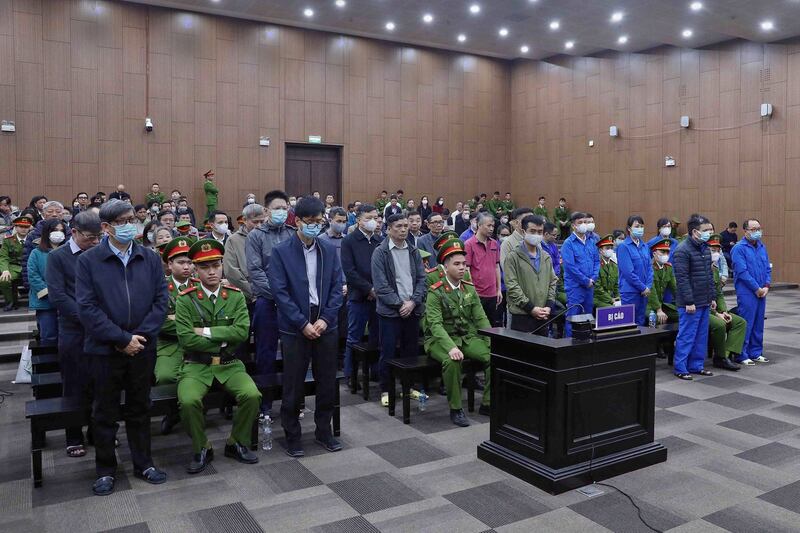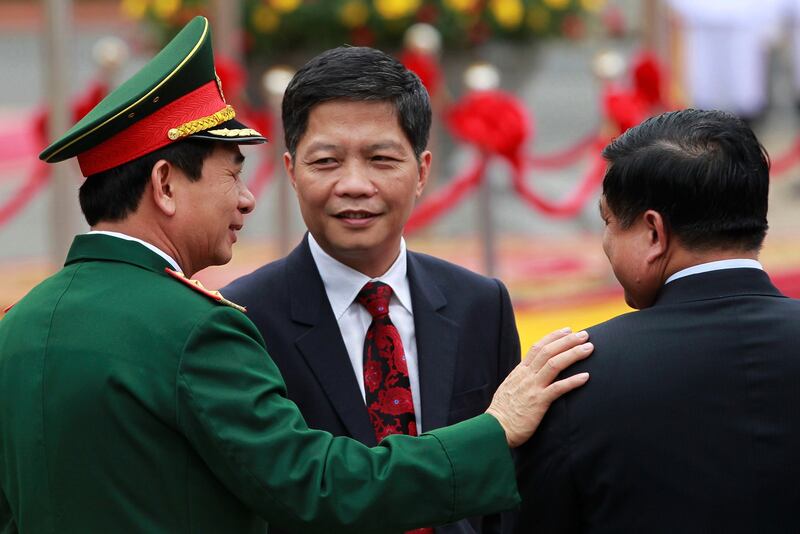It’s a tradition in Vietnam to clean one’s house thoroughly ahead of the long Lunar New Year holiday, which falls on Feb. 10 this year, for fear of sweeping away any good luck that Tet may bring.
That goes for the Communist Party of Vietnam (CPV), which just forced a Politburo member, the third in 13 months, to resign, as part of the ongoing “blazing furnace” anti-corruption campaign.
Like China's notorious shuanggui system, CPV members are subject to party discipline first. The Central Inspection Commission (CIC), headed by Politburo member Tran Cam Tu, is responsible for conducting investigations of senior party members. It's only after the party has rendered its verdict that people are potentially handed over to civilian authorities for prosecution.
The CIC can hand down four levels of punishment: expulsion, loss of party positions, warning and reprimand.
The latter two can be meted out to party committees, not just individual members. Since January 2021, some 1,400 party organizations have been disciplined.

Last year ahead of Tet, Deputy Prime Ministers Vu Duc Dam and Pham Binh Minh, and President Nguyen Xuan Phuc, were all forced to resign. The latter two served on the elite 18-member Politburo that was elected at the 13th Party Congress in January 2021.
Those high-profile purges roiled financial markets and foreign investor confidence. The three men were seen as some of the most competent administrators and interlocutors with the business community. For a country whose economy depends on foreign investment, the “Burning Furnace” campaign of General Secretary Nguyen Phu Trong raised concerns about political stability.
While the country's anti-corruption campaign continued, it shifted to lower-level officials and the business partners of politicians (and they all have business partners). Of course everything was superseded by the investigation into Truong My Lan and Van Thinh Phat, a $12.3 billion fraud and embezzlement scheme.
Energy sector
General Secretary Nguyen Phu Trong truly believes corruption within the party poses an existential threat. Since the 13th Central Committee, over 60,000 CVP members have been disciplined; 80 of them were central-level cadres. 10% of the original 180 Central Committee members elected in 2021 have lost their job, as have three of 18 Politburo members.
Energy is seen as one of the government’s economic vulnerabilities and a real irritant to investors. Manufacturers require stable electricity, while investors in energy have been frustrated by government corruption, opaque regulations and the slow pace of policy implementation. Being highly regulated, the energy sector is prone to corruption.
It should come as no surprise that the Central Inspection Commission has been focused on this sector. Over 80% of those disciplined at the 25th CIC session in January, including 15 individuals and nine party committees, were from state owned enterprises or government ministries involved in the energy sector.
The CIC determined that the Central Committee should decide the fate of four senior party members, though recommending that they should be "appropriately penalized."
The four included Politburo member Tran Tuan Anh, the head of the Central Economic Commission, the party's point man for economic issues. From 2016-21, he served as the Minister of Industry and Trade, where he oversaw the energy sector.

On Jan. 31, the Central Committee held an unscheduled session where Anh tendered his resignation. It appears that he was given a face-saving way out, as his father, Tran Duc Luong, had served as Vietnam’s president from 1997-2006.
Beneath Anh were a host of other officials tied to the energy sector.
The Central Committee reprimanded Mai Tien Dung, a former Central Committee member and head of the government office, which is the locus of inter-ministerial coordination, and Trinh Dinh Dung, a former deputy Prime Minister from 2016-2021, who was in charge of the energy sector.
Provincial profiteering
The Central Committee also expelled two others who had recently been arrested for corruption: Do Thang Hai, a member of the Central Committee’s Organization Commission and Deputy Minister of Industry and Trade, and former Deputy Minister of Industry and Trade, Hoang Quoc Vuong, who was also the chairman of the Vietnam Oil and Gas Group.
Hai was arrested on December 21, 2023 for taking bribes from the Xuyen Viet Oil and Gas Co, a company that ensnared several officials. The firm is one of 40 companies that had a license to import oil, but one of two that dominated imports in the south, controlling an estimated 40% of the southern market.
The firm’s mismanagement played a large part in the oil shortages that hit Ho Chi Minh City in the third quarter of 2022 when there was a 40% decline in oil imports and a 35% decline in diesel imports. The firm had defaulted on US$62 million in taxes and owed some 5.5 trillion dong (US#225 million) to banks.

They sought to bribe their way out of legal and financial jeopardy.
This was no doubt a large scandal, and one that embarrassed the government and provided media fodder and caused investor alarm. Last year was the hottest year on record, and an early heatwave led to significant energy shortages. The country's long-stalled Eight Power Development Plan (PDP8) PDP8 energy plan, that runs through 2035, fell short of expectations, especially in the renewable field and the implementation guidelines have still not been approved.
Punishments have also been meted out to provincial-level cadres.
Tran Duc Quan, the party secretary of Lam Dong province and a Central Committee member, was arrested on Jan. 24 for management violations regarding real estate development. The CIC disciplined four other provincial officials that month.
Family fiefdom
But the case of Nguyen Nhan Chien, the former party chief of Bac Ninh province and a former Central Committee member, is really telling.
Chien had at least 23 relatives in leadership positions within almost every department and organization in the province, from civil affairs to social welfare to education. Bac Ninh was less a province and more of a family fiefdom.
This is not supposed to happen. In 2018, the CPV passed rules to ensure that cadres served in multiple provinces to prevent these fiefdoms. While the number of senior provincial cadres who have only served in one province is down, roughly 20 of 63 are grandfathered in under the old system.
Chien’s case should expedite the full implementation of the 2018 guidelines.

In the run-up to the 14th Party Congress, expected in January 2026, we should see more anti-corruption efforts focused on provincial leaders who comprise roughly one-third of the Central Committee. Given Vietnam’s relative decentralized authority, the provinces – the actual recipients of much of the foreign investment – are a locus of corruption.
But Anh’s forced resignation, the third in 13 months, also raises questions about central-level politics and the composition of the Politburo, itself, in the run-up to the 14th Congress.
The Central Committee has been deadlocked over the replacements for Minh and Phuc. Now with three vacancies, the Central Committee may be forced to act, especially given rumors of General Secretary Nguyen Phu Trong's ill health.
While Vietnam’s leaders may try to enjoy the festivities of Tet, given Trong’s propensity for house cleaning, no one should be too at ease. Several have already seen their luck – and ill-gotten gains – swept away.
Zachary Abuza is a professor at the National War College in Washington and an adjunct at Georgetown University. The views expressed here are his own and do not reflect the position of the U.S. Department of Defense, the National War College, Georgetown University or Radio Free Asia.
